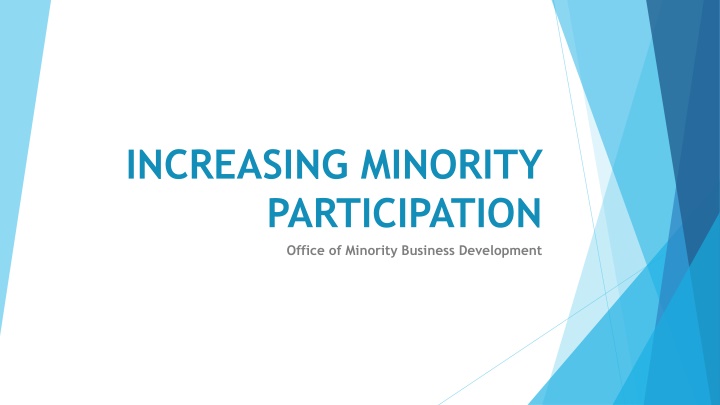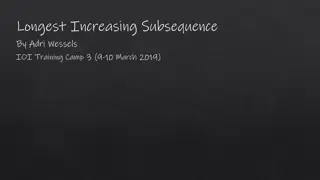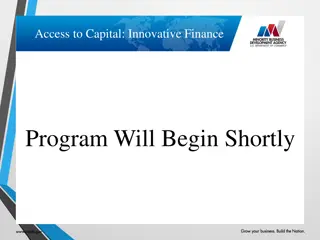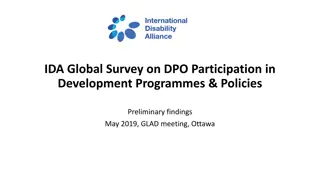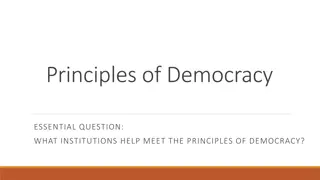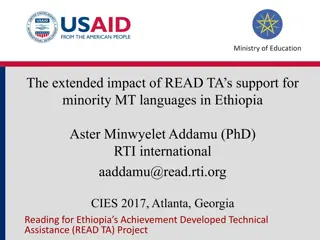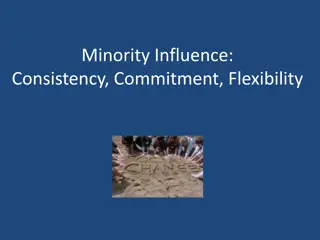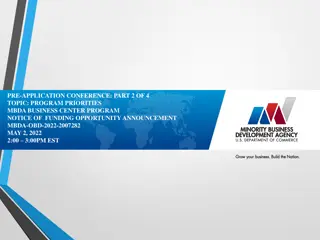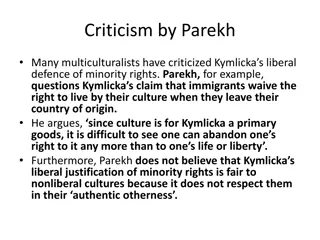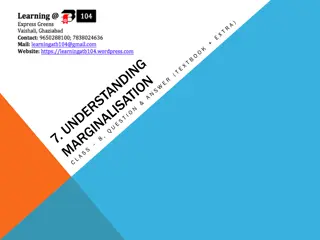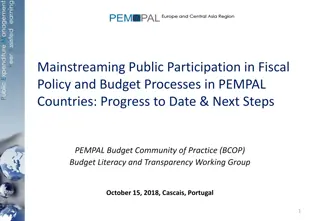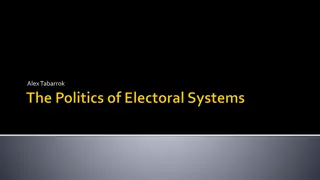Increasing Minority Participation in Business Development
Empowering minority entrepreneurs through the Office of Minority Business Development to enhance participation and success in the business world.
Download Presentation

Please find below an Image/Link to download the presentation.
The content on the website is provided AS IS for your information and personal use only. It may not be sold, licensed, or shared on other websites without obtaining consent from the author.If you encounter any issues during the download, it is possible that the publisher has removed the file from their server.
You are allowed to download the files provided on this website for personal or commercial use, subject to the condition that they are used lawfully. All files are the property of their respective owners.
The content on the website is provided AS IS for your information and personal use only. It may not be sold, licensed, or shared on other websites without obtaining consent from the author.
E N D
Presentation Transcript
INCREASING MINORITY PARTICIPATION Office of Minority Business Development
Mission Our mission is to facilitate, produce and advance opportunities for Minority Business Enterprise (MBE), Emerging Small Business Enterprise (ESB), and Disadvantaged Business Enterprise (DBE) to successfully participate in the full array of contracting opportunities available in the City of Richmond. Minority Business Enterprise (MBE) A business at least 51% of which is owned and controlled or 51% minority-owned and operated by minority group members or, in case of a stock corporation, at least 51% of the stock is owned and controlled by minority group members as defined by the City of Richmond. Minority group members are citizens of the U.S. who are African-American, Hispanic- American, Asian-American and American Indian. Emerging Small Business (ESB) Has been certified by the Office of Minority Business Development for a period of up to seven years; Has annual gross receipts of $500,000.00 or less for each of its three fiscal years preceding application for such certification if engaged primarily in the construction business, or of $250,000.00 or less if engaged primarily in a non-construction business; Has fewer than ten full-time, permanent employees; Is not a subsidiary of another business and does not belong to a group of businesses owned and controlled by the same individuals; Has its principal place of business entirely within the boundaries of a City enterprise zone; Possesses a City business license; and Pays personal property, real estate, and business taxes, as applicable, to the City. Disadvantage Business Enterprise (DBE) For-profit small business concerns where socially and economically disadvantaged individuals own at least a 51% interest and also control management and daily business operations.
2-Pronged Approach 1. Goal Setting 2. Technical Assistance
Goal Setting The Office of Minority Business Development puts a goal on all qualified procurement over $50K Goals are determined by a formula that takes into consideration the total number of available qualified vendors and the total number of available qualified MBE/ESBs Under 50K procurements, 3 quotes are required and 1 quote must be from an MBE/ESB . The bid with the lowest cost is selected Currently, these goals are only aspirational, due to the absence of a disparity study Last fiscal year tracking approx. $330M or 10% minority spend
Technical Assistance Classroom Training: Business Plan Writing Financing (cash flow, QuickBooks, Banking including preparation for funding) Marketing (web design, social media, planning) Construction Series (bonding, estimating bid preparation, legal issues) Industry specific classes Workshops SWAM Registrations Business licensing Mobile food business Conference/Conventions Procurement Marketing Financing One-on-One Sessions Coaching Consultations
Current Collaboration of the Office of Minority Business Development (OMBD) and Department of Procurement Services (DPS) Background Regular meeting of the Director of Procurement Services and Director of the Office of Minority Business Development Initially met once a week to address issues and develop solutions; now collaborate on an as needed basis . OMBD scores vendors on a 30% scale On a 100% scale vendors must score at least 15% of the MBE 30% score to qualify for points. We are vetting an increase of the 30% OMBD sets goals on solicitations Goals are based on scope of work and availability of MBEs that provide the requested goods or services. OMBD & DPS monitor goals Monitor compliance monthly and DPS Director sends email to responsible City Project Managers asking them to communicate with the contractor our expectations of the contractor s compliance with agreed upon utilization goals. OMBD & DPS create outreach activities Set up opportunities allowing procurement liaisons to network with MBEs via highlighting MBEs with procurement liaisons sessions. Must resume activities post Covid-19. OMBD & DPS worked to develop bi-weekly payments Vendors can request to be paid every 2 weeks versus every 30 days to improve their cash flow. OMBD & DPS worked together to prepare a comprehensive Disparity Study RFP We received 6 proposals. In the process of reviewing. Hope to make an offer by end of September or first of October.
Low Hanging Fruit Recommendations requiring no or low cost to implement and/or no or low barriers Departmental Goals All departments mandated to meet annual MBE goals or provide documented explanation why goals have not been met. Goals must be reported quarterly. Performance should be part of the annual review of Procurement staffer, Director, DCAO and CAO. Mandatory educational classes on systemic racism and conscience/unconscious biases All City employees should be required to participate in training to get a better understanding as to why goals are necessary and equitable. City needs to give additional scoring points to vendors who also take the class during a solicitation. Tracking MBE statistics Add an optional section on business licensing and permit applications for vendors to provide MBE information, so we can track the progress or lack of progress for minority business (i.e. number of business, revenue, and number of employees). Implementation of B2GNOW B2GNow is a nationally utilized software that collects data for organizations to register and track MBEs, solicitation opportunities, pricing data, marketing opportunities, and goal- setting assistance. MBE Goals for Construction Managers Construction Managers should be held accountable for meeting MBE goals, and performance should be a part of their evaluation. Pool of Construction Managers City should rotate construction managers. City should try not to use the same construction manager on all projects. (There should be a minority firm participating in the pool.) Sub-vendor payment All prime contractors must pay subs within 7 days after receiving payment from the City. There should be a prompt payment clause in the City s contract with the prime that overrides any payment clause in the prime s contract relating to sub payments. Prime Evaluation and project debriefing Subcontractors should have the opportunity to evaluate the primes and have a debriefing session with all pertinent parties at the conclusion of all major projects.
Other Recommendations Recommendations we are reviewing strategies to implement Review all contracts with option to renew and put out for rebids Educating and holding accountable the City s Project Managers (regarding MBE utilization) would help them make better decisions regarding whether a renewal or new solicitation is the appropriate procurement action. Create a Financial Pool Work with lending institutions to pool money and designate for higher credit-risk businesses. This will reduce the risk on any one institution while increasing funds availability. This could include a self-insurance risk pool for bonding and insurance requirements on construction contracts. Must also re-establish qualification requirements. Traditional requirements is structurally bias for minority businesses. Work with attorney to create a pool of contract attorneys to assist businesses that cannot afford market rate fees and render assistance at affordable pricing. Also serve as mediators in disputes between primes and sub primes in lieu of court. City could also help subsidize fees. Create a Legal Pool Developer Minority Plan template Require real estate developers to follow a template similar to the North of Broad MBE plan/template. Staffing should be increased by a minimum of 3 staffers to address the technical assistance needs of MBEs. Operating budget should be a minimum of $100k. Increase OMBD staffing and operating budget Increase DPS staffing and operating budget In support of OMBD, DPS needs personnel dedicated to working closely with OMBD to ensure universal success. Anchor Institution Memorandum of Understanding (MOU) The City can create MOUs with Anchor institutions and all institutions receiving funding from the City to commit to an agreed upon MBE goal and reporting schedules. The MOU can also identify a sheltered-market program for the Anchor Institutions collectively or individually. 2 Checks Issued to Prime The prime would be issued a check payable to the prime and a different check payable to prime and subprime. This will alleviate the practice of primes holding and/or possible using the sub primes money and paying the subprime at a much later time than necessary. Redistribute CDBG funds to address the needs of MBEs Use funding to create programs and assistance to MBEs
Challenging Recommendations These recommendations require legal and/or present other major challenges. Include incentives in solicitation that would incentivize vendors to meet and/or exceed goals. Incentive to meet minority participation goals 5% Pricing Spread Allow MBEs to have as much as a 5% higher price when competing and winning bids. Sheltered Market Remove legal barriers preventing Sheltered Markets for MBEs. (Sheltered Market is a program that sets aside procurement opportunities.) Enforcement Guidelines Identify penalties for not reaching MBE goals Removal of Disparity Study requirements Remove the Federal requirements for a disparity study to set and enforce minority participation goals. Create a Reparation Act Act would include funding to address the needs of minorities created by systemic racism (i.e., capital to fund and grow businesses, free school tuition, funds for buying a house, legal assistance, release of inmates with excessive sentencing and replace with rehabilitation programs, assignment of case workers for low income families, free healthcare for low income families, etc.). Free college tuition May want to start with Community Colleges. Minority Representation on all procurement solicitation committees (OMBD staffer or designee) Currently, Minority participation is limited to the 30-point scoring. Would like to have at least one minority voting member. This additional scoring member would need to have a broad range of experience and expertise, particularly for construction and other complex procurements.
Top Recommendations Restructure Loan Qualifying Requirements Funding to Restructure Delivery of Technical Assistance Establish Legal Assistance Create a Meaningful Reparation Act Mandatory Training on Racism and Its History Create Sheltered Markets
